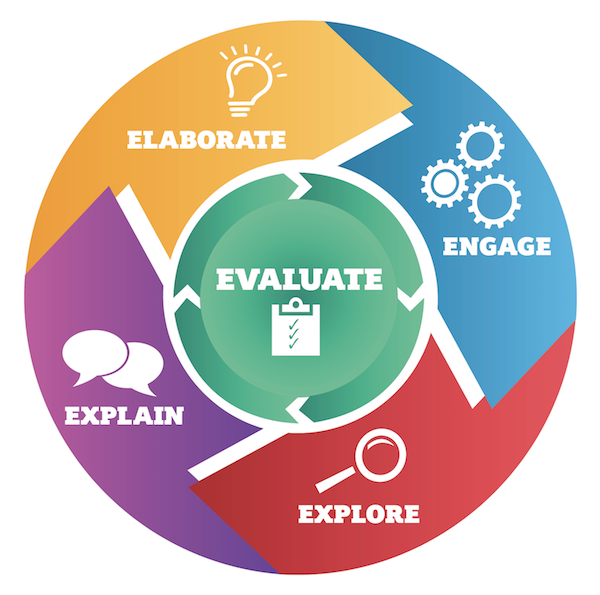What is Inquiry Science?
By Tracy Lavallee Exemplars Science Editor and Consultant

“When you are filled with wonder, the world is a wonderful place to be.”
- Winnie the Pooh
The terms “Inquiry” “inquiry-based learning,” and “inquiry science” get used a lot in the world of education. But it’s worth inquiring: What does “inquiry” really mean?
Webster's Dictionary defines inquiry as, "to question, to query, to ask, to investigate, to explore."
Another definition of inquiry is, “...an approach to learning that involves a process of exploring the natural or material world, and that leads to asking questions, making discoveries, and testing those discoveries in the search for new understanding.”
…which helps bring the term into focus. But let’s make it even clearer: At Exemplars, we know inquiry is driven by curiosity, wonder, surprise, awe, and a desire to make sense of the world around us, both natural and material. And we believe that inquiry is the best way to learn and teach science.
Consider the 5E Model of Inquiry-Based Instruction, which encourages student inquiry and engagement:
Source: NGSS and San Diego County Office of Education
Through this process students are observing, raising questions, making predictions, testing hypotheses, and creating conceptual models. They collect and record data, make representations of results, and draw upon other resources such as books, videos, websites, and the expertise of others.
It is not a linear process; rather, it’s one where new questions are asked and new observations are made, where students can go deeper in their understanding. Students interpret data and observations to explain and elaborate their findings using data and evidence. There is communication and collaboration with others throughout the process of inquiry. Students practicing inquiry are scientists, doing what scientists do in the real world.
Our job as teachers is to provide our students with opportunities for inquiry.
We can look at what and how we teach and make subtle shifts that give students more and more responsibility for their learning. As students practice and become more comfortable with the process of inquiry they can begin to pose their own questions and plan their investigations based on their questions. We guide them through this process, providing them with many varied and open-ended tasks.
We know this to be best practice and want to teach this way, but our curriculum seems to get bigger and broader every year, making it harder and harder to incorporate time for science inquiry.
Exemplars understand the constraints on your time. We also know how hard teachers work to provide the best education possible for every student. We want to help you bring more inquiry into your teaching.
How do we make time for inquiry?
Our suggestion is to start simple and to start small. Helping students to learn to ask questions is at the heart of inquiry so let’s begin there. Provide students with interesting phenomena like a photograph, an object, an observation of the natural or material world, a demonstration, a challenge. Ask them: What do you notice? What do you wonder? What do you think? From questions comes the desire to find out for themselves how and why things work the way they do.
Here are three ideas you can use with your students to bring more inquiry into their learning.
- Observations: This is a simple way to get students to observe the natural world more closely and to ask questions that can lead to deeper understanding and even a deeper respect for their environment. It can help students develop a sense of place where they live and go to school. A leaf, tree bark, an animal sign, clouds, weather, water sources, erosion, flowers, insects, rocks, etc. The list is endless. Give students a clipboard to take with them outside as they record observations and questions they have. Encourage them to use their senses as they explore.
- Inquiry Bags: Put everyday objects such as a pencil, clothes pin, eraser, toothbrush, paper clip, rubber band, etc into a brown paper bag. Give each group of two a bag to explore. Ask them to write down questions they have about the object. How might they find out the answers to their questions? Have them find other objects from home or school that they are curious about and share these with classmates.
- Bunny Copters: Give each student a single bunny copter found on page 5 of the Exemplars Bunny Copter Science investigation. They will also need a few large and small paper clips as well as scissors. Their challenge is to get the bunny copter to spin when they drop it from over their heads. As they explore, have them think about the questions they have about how the bunny copter works and what things they might try. This exploration can lead to many additional investigations with bunny copters. Students may wonder about the size of the bunny copter, the length and width of the ears, the type of paper used, the weight, the criteria for what makes a good “spin,” and many others that may arise.
Once your students have experienced inquiry science, they’ll want to go deeper. You will, too—and we have the materials and tasks to help you achieve it. Exemplars Science gives students challenges that are rich with inquiry, stimulating their curiosity and making them want to know more. Our tasks help engage and re-engage students with their sense of awe, and give them the skills to discover what a wonder-full world we share.
Inquiry Learning Supports 21st Century Skills
While inquiry and the ability to ask questions are at the heart of science, they are also very important 21st Century Skills: Curiosity, imagination, self direction, innovation, questioning, communication and collaboration as well as others are necessary for our students so that they can be informed citizens of our world. Scientific literacy and the ability to interpret and think critically are at the heart of our science tasks. The inquiry process can and should be a natural part of everything we teach. Reading, math, social studies all have multiple avenues for incorporating opportunities for more inquiry. Learning the process of inquiry through science enables students to apply these skills across other disciplines and subject areas.


